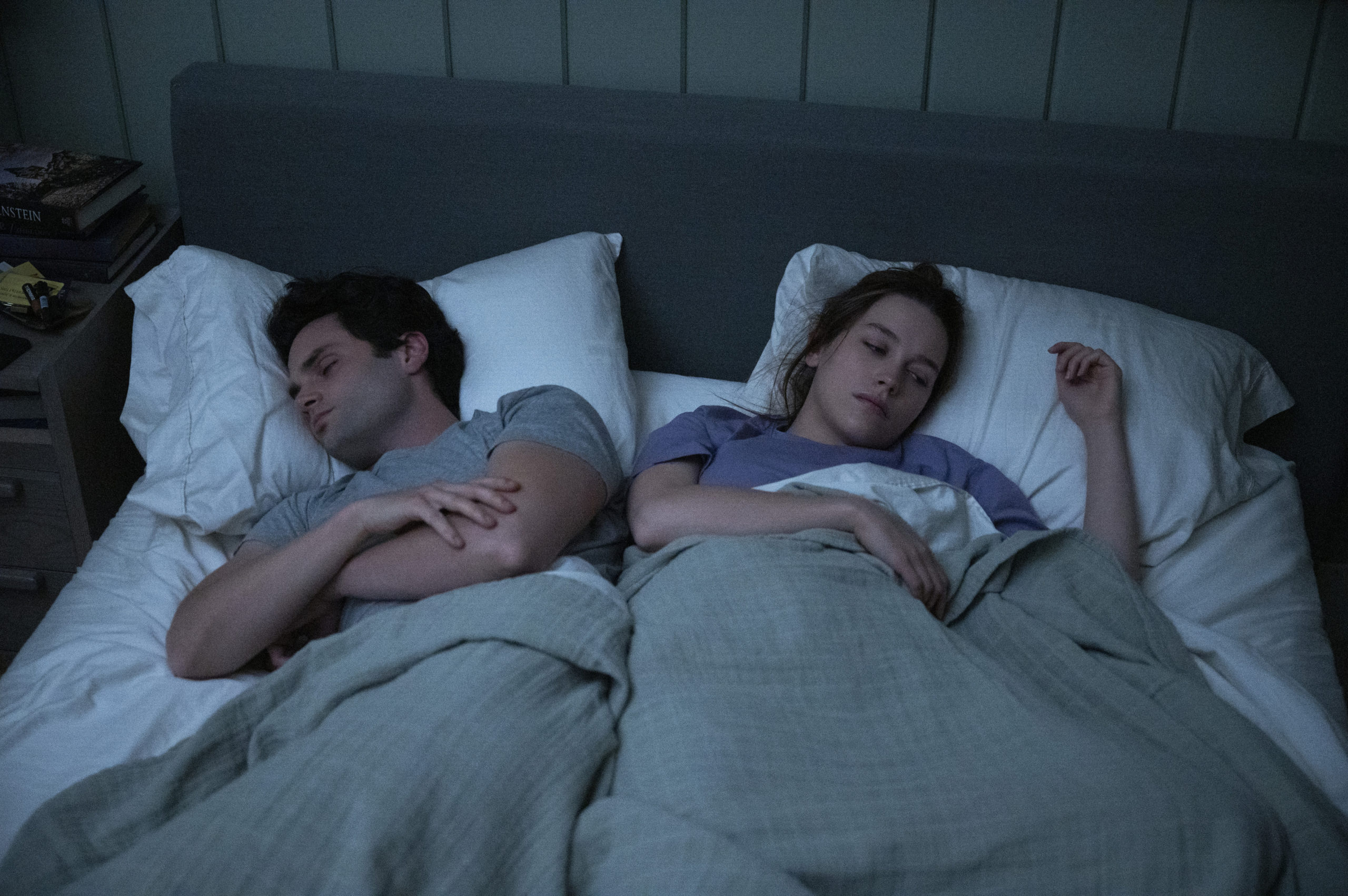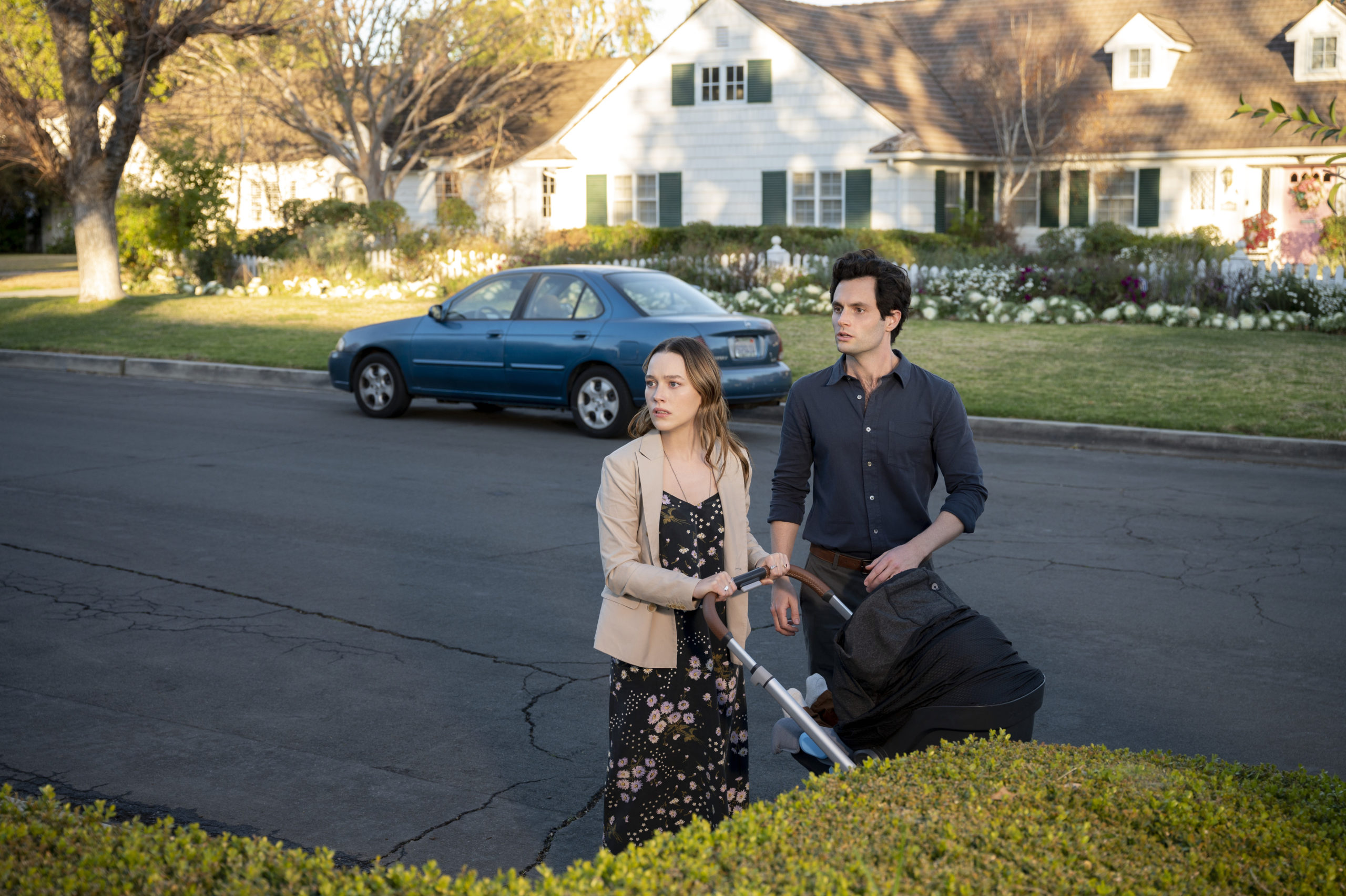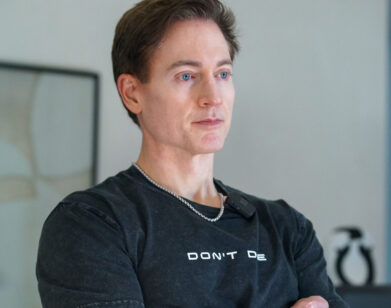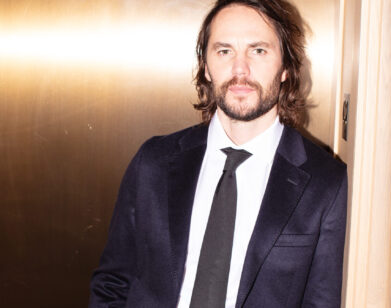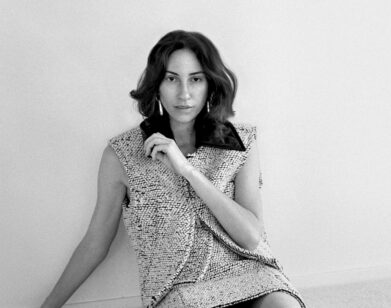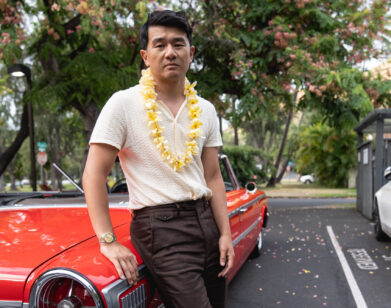in conversation
Penn Badgley and Victoria Pedretti Drop Some “YOU” Spoilers
We all know how the classic American love story unfolds: “boy” meets “girl” is followed by a pursuit, culminating in the loving union of two seemingly perfect people, a nice house in the suburbs, and, of course kids. LOTS of kids. But YOU, Netflix’s wildly popular psychological thriller, has received critical acclaim for peeking behind the curtain of this kind of white picket fence romance. In the first episode of YOU season 3, Joe Goldberg, the diabolical obsessive mastermind played by Penn Badgley, opens with a simple question: “What happens after boy gets girl?”
In the case of Badgley’s character— a stalker who deftly finesses his way into the lives of unsuspecting women— this question is a particularly sinister one. After relocating to the suburbs with his wife, Love Quinn (played by Victoria Pedretti), and their newborn son, the new season of Netflix’s wildly popular sees Joe set his sights on a new conquest that threatens to disrupt the picture perfect life that the pair have built together. If YOU’s previous two seasons stunned with twists and turns, its third season thrusts viewers into still more unpredictable psychological territory, in which Joe and Love dismantle the mythology surrounding love and romance, one cold-blooded murder at a time. “[Joe] was denied something essential very young,” Badgley observes to Pedretti during their recent Zoom call. “I’m always curious to see if people are interested in this part of the conversation.” Below, the YOU co-stars and on-screen lovers sit down for a heady conversation about dismantling flawed Hollywood systems, on-set parenting, and—ALERT—they even drop a few spoilers. Read on, at your own risk.
———
PENN BADGLEY: Victoria, how’re you?
VICTORIA PEDRETTI: I’m doing alright! How’re you?
BADGLEY: Same. I’m actually in Illinois right now.
PEDRETTI: Oh wow! What are you doing there?
BADGLEY: I spoke at the University of Illinois with a friend who’s a professor. We have this developing conversation series.
PEDRETTI: That’s cool!
BADGLEY: It’s basically this conversation series with my friend Nura Mowzoon, a professor at ASU with a doctorate in marriage and family counseling and relationships. We discussed how close relationships are training grounds for making societal relationships more healthy and functional. If you think about it, if two people are struggling to understand what it means to have a truly functional relationship, how can we expect much larger systems of people to run smoothly? So, the idea is that the our closest relationships are intimately connected to this process of social transformation. It’s one aspect of the thesis that I’m honing in on—it’s the way we should think of grassroots organizing.
PEDRETTI: That makes me in terms of how I approach being a parent.
BADGLEY: What do you mean? I think I get it, but say more.
PEDRETTI: When you’re in a romantic partnership, there’s a sense of equality there — I believe that there ought to be — so people take on equal levels of responsibility. I imagine that being a parent would be unlike anything I’d ever experienced before. The closest thing I can think of is the places in which I’ve had to be a leader and take on a larger responsibility, and it’s a whole different way of existing in relation to people, I think.
BADGLEY: Do you feel that there’s this inherent leadership built into being an actor?
PEDRETTI: I think as an actor we tend to have that foisted on us, because our behavior sets a cultural tone. Actors have that ability, because a lot of things move around us. I hear about a lot of actors that make everybody’s day a lot worse because they don’t take on that responsibility.
BADGLEY: It’s totally true.
PEDRETTI: Which isn’t like being a parent to the whole set, right? It’s not a perfect metaphor.
BADGLEY: I mean, this is the first time I was really working in-depth, day in, day out. You know the way it is on our show. It was the first time I’d worked as a parent, and it shifted my priorities.
PEDRETTI: Is it a positive shift?
BADGLEY: It’s just a deepening of awareness. For example, whenever anyone mentions something like systemic injustice in our industry, it becomes a ripple conversation about the logistics of a set. Take the hours. Hours in our industry are so long and grueling basically because the cost of the rental equipment is by the day, not by the hour. If you change that construct, then people would see their families more. Carpenters on set, gaffers, and grips—everybody is going from one job to the next. This season, I really felt what it was like to not see my baby for sometimes days at a time. It’s a pattern that’s very hard to get out of. I’ve been thinking about that more now.
PEDRETTI: I’ve heard many arguments for how making these changes can actually save money. They’ve created a system that’s deeply flawed and doesn’t actually make any sense, while simultaneously making people’s quality of life substantially worse and in a way that’s not sustainable. It’s really bizarre when you try to challenge people on these things. So often the only response that can exist is “Well this is just how it goes, and this is how it’s been going.” When it comes parenting, you can raise your children exactly how you were raised…
BADGLEY: …Or you can stop cycles. I almost feel like… well, I was gonna say something that is probably not true at all, now that I think about it.
PEDRETTI: You gotta say it!
BADGLEY: When it comes to ending generational cycles, which is definitely the hardest and most significant thing that anybody can do, we often forget about our blind spots. It’s very hard being a parent, because you’re suddenly compelled to transform in order to end certain cycles. Every single one of us is part of some kind of generational cycle, and often it’s trauma, but we do have the responsibility to change that.
PEDRETTI: I mean you’re deeply invested in this new human’s future. There are so many ways that we see this tradition, which is partially biologically upheld, I guess, where women are primary caretakers. Meanwhile, men are very capable of that, and can offer so much stability and tenderness to their children that doesn’t necessarily fit into the stereotype of fatherhood as we often see it represented in the media. And it’s not funny, but I find myself laughing because it’s just so overwhelming.
BADGLEY: What’s interesting about our industry is the specific kind of leadership that is given to an actor or a lead in a project. It comes with a kind of straight jacket– they put up blinders to make sure that we don’t see how the sausage is made, so to speak. There’s a certain level of protection and preciousness around our treatment which we’re often blind to, and if you don’t work against that, it can disempower you in leadership positions. We’re given the pretense of being a leader and the way you behave very much affects everybody, but you’re not actually given any tools to really engage with that in a real way. It’s very strange. That’s why I think that actors becoming producers is almost a necessary step if you want to continue to work in this context. You need to be aware of how things function and how systems affect everybody you’re working with because, otherwise, these responsibilities become very surface-level. I’m not even accusing anyone of anything, I’m saying it just naturally becomes a very self-centered process, and even as people bitch about it, they help to perpetuate that star treatment. It’s something I’ve been seeing all my career. I want that to be different.
PEDRETTI: If we’re to continue my analogy, which I guess I’m holding on to, it’s like being a parent who’s being treated like a child.
BADGLEY: Yes! Actually, yes!
PEDRETTI: It’s completely inappropriate. It’s completely bizarre. It makes no sense.
BADGLEY: It’s disempowering for everybody, it’s frustrating. You want to talk about the show?
PEDRETTI: It just came out! Happy opening… it’s not an opening really… but it’s out! Happy out-ening. Happy release day.
BADGLEY: Have you seen all the episodes? Because I haven’t finished.
PEDRETTI: I finished it now. And damn, we got spoilers while we were doing press, so I was like, “Well, I might as well watch it.” I’m feeling pretty good about it, I’m excited that people are finally seeing it.
BADGLEY: Obviously there’s this joke about how I talk about the show publicly, but as an actor, my relationship to characters is between action and cut. I not only have compassion for them but plainly understand them in some ways. There is something about a man struggling with the standard of masculinity that is impossible to meet, both physically and emotionally. It’s disempowering emotionally — not being able to express your emotions — and also needing to be some kind of hero. When you think of Joe as a real person, he was denied something essential very young. I’m always curious to see how much, even for a show that’s very binge-worthy, people are interested in this part of the conversation. How much do they actually think about it when they watch it? I’m excited to see how many people think deeply about the dynamic between Joe and Love, in particular, and the ideal of the perfect relationship, and of marriage.
PEDRETTI: I had this really strange moment when I was watching it, and I was like, “Oh my god, she’s crazy!” I didn’t fully appreciate the intensity of this character until that moment, and it felt intense. I just know that I have to keep sending love towards her. And I wonder if it feels like a powerful thing to play this character that embodies all the things that so many men struggle with, including yourself to some extent. Is that a positive thing for you?
BADGLEY: To be honest, sometimes I do struggle with the spectacle of it all, and how much Joe has become a kind of icon. Then living and breathing life into this kind of character is obviously something that can be disturbing, and sometimes I grapple with it. But when you put it that way, it actually makes me think of the new muscles that are developing in the next season— sadly, in your absence.
[Both laughing]
BADGLEY: I have a friend driving next to me who was just like, Ughhhh, so I guess I just spoiled something about next season. Sorry readers… But in Love’s absence, I’ll have to exercise more love! I’ll have to learn what it is to love in Love’s absence.
CAR PASSENGER: I can’t believe you just did that…
BADGLEY: You knew she was gonna die! Because it’s Joe!
PEDRETTI: I can’t believe you did that!

